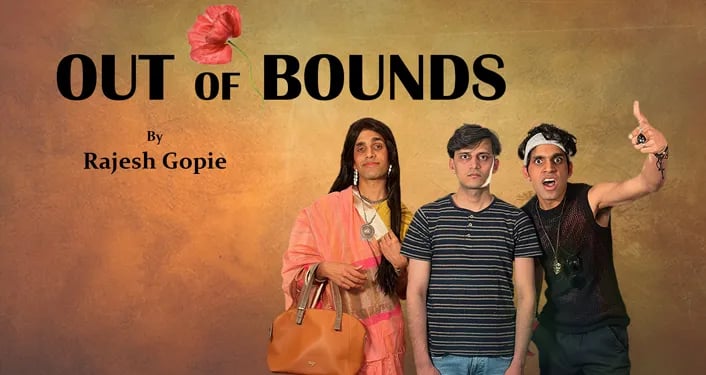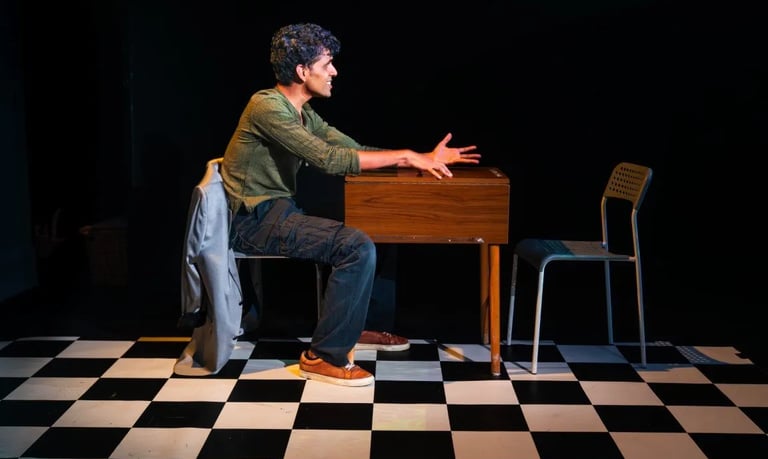REVIEW: Out of Bounds - A Journey Through Memory, Identity, and Apartheid
Review Date: 24th July 2025@Jack Studio Theatre
REVIEWS
Kassy Fang
7/28/20253 min read


Rajesh Gopie’s Out of Bounds first premiered at Johannesburg’s Market Theatre in 1999 and went on to become an international success, being performed across four continents and earning the 2001 Fleur du Cap Award for Best New Indigenous Script. Now, more than two decades later, it returns to the stage with fresh resonance in a one-man revival at Brockley Jack Studio Theatre, directed with precision by Clare Stopford and performed with heart by Jason Saldanha.
The semi-autobiographical play draws from Gopie’s own experience growing up as part of the Indian community in 1980s Natal (now KwaZulu-Natal), South Africa, under apartheid. With humour, warmth, and irony, it explores life in a "joint family" household, where three generations live under one roof, observing spiritual rituals, gendered spaces, and the unspoken codes that shape daily life. While Gopie’s writing brims with rich domestic detail and affectionate cultural observation, from Bollywood fantasies to disco fever, its emotional core lies in how these intimate settings intersect with the brutal realities of apartheid.
Jason Saldanha, himself the child of immigrants, takes on more than 30 characters, moving between voices, gestures, and rhythms with fluidity. As Lall, the young narrator, Saldanha guides us through rites of passage such as childhood memories, teenage rebellion, university parties, loss and desire, often using just a single prop or turn of phrase to bring a character to life. The most striking sequences are those that unfold in the gendered spaces of the family home such as kitchens, courtyards, and lounges, where the rhythms of family conversation are rendered with sharp comic timing and underlying emotional nuance.
The staging is minimalist but rich with meaning. A circular patch of green grass marks the central playing space, creating an inside-outside divide that reflects Lall’s negotiation of cultural boundaries. Behind this, the set expands into domestic interiors: a sofa, folding screen, and tea table evoke a fragment of colonial-era Indian style, referencing the legacy of indentured labour, including Lall’s grandmother, sent from India to work in South Africa’s sugarcane plantations. As the narrative moves into the mid-1980s, when the family is displaced by violent unrest and relocated to Phoenix Settlement (founded by Gandhi), the set evolves into a starker, modern design. Black-and-white floor tiles replace warmth with austerity, mirroring the family’s economic and emotional adaptation.
Beril Yavuz’s lighting design contributes significantly to the emotional landscape. Spotlights isolate Lall’s inner thoughts, while warm glows highlight moments of tenderness. Projection is used sparingly but to great effect—flickering mango trees from Lall’s childhood seem to rustle with memory. The ending scene is especially evocative: a toy ball, gifted by Lall’s father, lights up as it bounces in the darkened space, symbolising the enduring glimmer of memory, joy, and unresolved grief.
The play’s linear narrative makes it accessible, yet its thematic range is vast. Issues of race, masculinity, social class, and identity are tightly woven into the storytelling. One especially powerful scene shows the family visiting the beach to celebrate the grandmother’s birthday. The mood shifts dramatically when the police arrive and force them to leave, declaring the area a "whites-only" zone. This act of state violence, rooted in apartheid-era segregation, reaches a peak when Lall’s father declares, “This is the Indian sea, not part of it, but all of it.” The moment lands with force, underlining the ongoing relevance of racial injustice both in South Africa and elsewhere.
However, not every theme is explored in depth. For example, the aftermath and social impact of the arson attack that led to the family’s relocation are left largely unexamined. Similarly, the generational tension around different forms of resistance to patriarchy and heteronormativity is only briefly addressed. While time constraints may have limited how far each strand could be developed, the production still demonstrates an awareness of the complexity of these issues.
★★★1/2
This show is currently performing at Brockley Jack Studio Theatre until the 2nd of August. For more information, please visit: https://brockleyjack.co.uk/jackstudio-entry/out-of-bounds/
©️Shooting Star Studios


Credits
Cast: Vkinn Vats and Jason Saldanha
Written by: Rajesh Gopie
Directed by: Clare Stopford
Set Designer: Neha Jethva
Lighting & Sound Designer: Beril Yavuz
Produced by: Vkinn Vats & Neha Jethva for Shooting Star Studios
©️Shooting Star Studios
Sound Behind Curtain
A place for all Asian artists.
© 2026 Sound Behind Curtain. All rights reserved.
Your gift keeps the curtain rising for Asian creatives.
About
Contact
